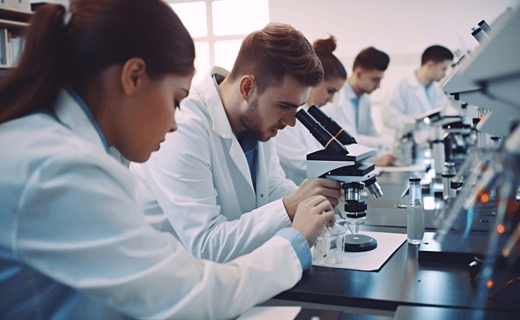Science is a vast field of study that focuses on helping us to better understand the world around us, from how the cells in our bodies work to the life cycles of stars. Science includes many different disciplines, and learning about them helps people to solve problems in our lives, invent new things, and appreciate the complexity of our world.
Natural Sciences
The natural sciences examine the properties of the natural world. Fields within the natural sciences include physics, chemistry, and biology.
Physics
- Physics is the study of matter and energy and the forces that act on both.
- Physics explains things like why a dropped object falls to the ground and why planets orbit the sun.
- This field includes many subfields. For instance, astrophysics studies stars and galaxies, thermodynamics focuses on how energy moves from one place or form to another, and quantum physics looks at the tiniest particles that make up everything in the universe.
Chemistry
- Chemistry is the study of substances and how they change when they are combined.
- Chemists can help us understand things like why metal rusts and how baked goods rise in the oven.
- Some chemists use their knowledge to invent new materials, like plastics and medicines.
- Subfields in chemistry include organic chemistry, which is centered on things that contain carbon; inorganic chemistry, which studies non-living things; and biochemistry, which examines the chemical processes that take place inside of living things.
Biology
- Biology is the study of living things, including how they grow, what they need to live, and how they interact with each other and their environment.
- Biologists work on many projects that affect how we live, from developing new medicines to finding ways to improve how farms grow food.
- Areas within the field of biology include genetics, the study of how traits are inherited and how genes work; botany, which focuses on plants and how they grow; and zoology, which looks at the physiology of animals and how they interact with their environment.
Formal Sciences
The formal sciences focus on abstract ideas and logic, and these areas of study form the foundation of other areas of science.
Mathematics
- Mathematics is the study of numbers, shapes, and patterns.
- Math is used in every area of science to gather and examine data and solve problems.
- Subtopics within mathematics include algebra, the basic language of math that helps people to structure and solve problems; geometry, the study of shapes and spatial relationships; and calculus, the area of math focused on how things change.
Computer Science
- Computer science is the study of computers and algorithms.
- Computer scientists typically do work that involves writing or analyzing computer code.
- In the field of computer science, specializations include software engineering, the development and maintenance of software; artificial intelligence, which uses machine learning and neural networks to create machines that mimic human intelligence; and theoretical computer science, the study of broader concepts and applications such as algorithms, cryptography, and data organization.
Statistics
- Statistics involves the collection, analysis, and interpretation of data.
- Statisticians help people make better decisions by turning mountains of data into clear insights.
- Some statisticians focus on descriptive statistics, which summarizes and explains data, while others specialize in inferential statistics, which draws conclusions from data based on inferences.
Social Sciences
The social sciences examine how the human mind works and how humans work together in society.
Psychology
- Psychology is the study of how people think and behave.
- Psychologists commonly work to improve people's mental health and better understand cognitive development.
- Psychology has three branches: behavioral psychology, cognitive psychology, and clinical psychology.
- Cognitive psychology focuses on how we think and learn, while behavioral psychology focuses on how our thoughts influence our actions.
- Clinical psychology applies what we know about psychology to help people manage mental illnesses and behavioral disorders.
Economics
- Economics is the study of how people use resources, most commonly money, commodities, and consumer goods.
- Economists study the effects of human choices on the prices of goods, the values of stocks, the labor market, and other parts of the broader economy.
- Some economists study microeconomics, a field based on the decisions of individuals, while others focus on macroeconomics, examining factors that influence the economy as a whole, like unemployment and inflation. Behavioral economics, an area that combines economics with psychology to look at how people make economic decisions, is also part of the scientific field of economics.
Sociology
- Sociology is the study of human societies and how people interact. This field helps us understand how communities and cultures are formed and changed.
- The broadest subfield of sociology is social theory, which examines things like social structures, power dynamics, and societal change. Some sociologists specialize in a more narrow portion of an overall society, like the educational system or family dynamics.
- Criminologists are also sociologists. These professionals examine criminal behavior and analyze social factors that can increase the likelihood of crime.
Interdisciplinary Sciences
While science is divided into branches and specializations, the real world is not that neatly separated. Many things that we see around us cannot be explained by just one type of science. That's why many sciences are interdisciplinary, combining two or more types of science to study one part of our world. For instance, biochemistry uses what we know about biology and chemistry to gain a deeper understanding of how living things function, including metabolic processes, basic molecules like proteins and DNA, and the chemical action of enzymes in cellular activity. Neuroscience builds on both biology and psychology to better understand how our brains work. Materials science combines chemistry, physics, and areas like geology and biology to create new materials or better use existing ones. And astrophysics applies physics and chemistry to astronomy in order to study the universe beyond Earth.
Emerging Branches of Science
Science is always evolving as our understanding of the universe changes and expands, and sometimes, this leads to the creation of new areas of scientific study. For example, the field of environmental science came into its own in the 20th century as people began seeing the harmful effects of human actions on the environment. And many areas of science have been developed as a result of the emergence of computing and computer science, from data science (the analysis of computerized data to gain new knowledge) to nanotechnology (the engineering of materials and devices on the nano scale).
How to Pursue a Career in Science
The sciences offer a wealth of career possibilities, so this can be a good area to focus on for students contemplating their future. Younger students might conduct experiments at home or participate in science fairs or clubs to broaden their understanding, while high school and college students often have access to a wider selection of science classes and may also be able to find internships in scientific areas of interest. If you're unsure which major would best serve your career goals, consult your high school counselor or college advisor for guidance.
- What Is Science?
- Physical, Earth, and Life Science
- Understanding the Sciences
- The Relation of Physics to Other Sciences
- Different Branches of Science and Their Studies
- 20 Scientific Breakthroughs Aboard the International Space Station
- Interdisciplinary Science and the Next Big Breakthrough
- 11 Emerging Scientific Fields That Everyone Should Know About
- What Can You Do With a Science Degree?
- Fast-Growing Science Careers









